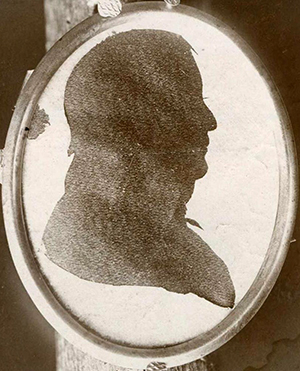Turner, James
20 Dec. 1766–15 Jan. 1824
See also: James Turner, Research Branch, NC Office of Archives and History
 James Turner, farmer, legislator, U.S. senator, and governor, was born in the part of Bute County that became Warren County in 1779. His father, Thomas, a farmer, had lived in Granville County since at least 1754; Bute was formed from Granville in 1764. By 1790 James Turner had enslaved twenty people and also owned two plantations, Bloomsbury near Warrenton and Oakland near Williamsboro, were associated with the family.
James Turner, farmer, legislator, U.S. senator, and governor, was born in the part of Bute County that became Warren County in 1779. His father, Thomas, a farmer, had lived in Granville County since at least 1754; Bute was formed from Granville in 1764. By 1790 James Turner had enslaved twenty people and also owned two plantations, Bloomsbury near Warrenton and Oakland near Williamsboro, were associated with the family.
Turner received scant education in local academies. As a teenager he served as a private in a local volunteer company that marched with General Nathanael Greene's army in 1781 during the last campaign of the Revolutionary War. An older neighbor, Nathaniel Macon, was in the same company, and a circle of young men soon forged ties of political interest that lasted a lifetime. By the time that Turner was elected without opposition as a Warren County member of the House of Commons in 1797, he was already identified with the "Warren junto," the name applied to Macon's adherents.
Turner served three terms in the house and then went to the state senate in 1801. He was reelected in 1802, and when governor-elect John B. Ashe died before taking office, Turner was the legislature's choice for governor. He was reelected for one-year terms in 1803, 1804, and 1805. His terms coincided with a period when the Jeffersonian Republican party took a firm grip on state affairs. His three gubernatorial messages to the Assembly were noteworthy mainly for their short passages expressing the Jeffersonian belief that education was a necessity for a free society. But they were devoid of concrete suggestions for public support of education and were not acted upon by the legislature.
When Montford Stokes declined to serve after having been elected, the state legislature sent Turner to the U.S. Senate on 21 Nov. 1805. Turner resigned as governor to join a Washington delegation from North Carolina dominated by Macon, then Speaker of the U.S. House of Representatives.
Although he stayed in a Capitol Hill boardinghouse that was also quarters for Macon, Turner showed some independence from his friend when Macon became a leader of a "Quid" Republican opposition to Jeffersonian policies. He embraced the Louisiana Purchase and staunchly supported the conduct of the War of 1812, unlike his North Carolina colleague, David Stone. Turner did not play an active role in Senate affairs, only being listed once as a committee member and that on the Committee on Enrolled Bills.
His service was increasingly mortgaged to bad health, and when he was unable to leave for the session of 1816, he sent a letter of resignation, dated 21 Nov. 1816, to Governor William Miller, another Warren County neighbor. Turner took no further active part in politics and died at Bloomsbury, where he was buried.
Turner was married three times and survived by his third wife. In 1783 he married Mary Anderson of Warrenton, and they had four children: Thomas, Daniel, Rebecca, and Mary. She died in 1802, leaving, according to her obituary, "a smiling race of pratlers." Anna Cochran became Turner's second wife in 1803; she died in 1806. He married Elizabeth Johnston, widow of Dr. William Johnston, in 1810, and they had two daughters. Their daughter Rebecca married George E. Badger, of Hillsborough, later a congressmen and Secretary of the Navy in the administrations of presidents William Henry Harrison and John Tyler. Turner's son Daniel was a graduate of the U.S. Military Academy, an officer in the War of 1812, and a congressman in 1827–29.
References:
Samuel A. Ashe, ed., Biographical History of North Carolina, vol. 3 (1906).
Biog. Dir. Am. Cong. (1971).
John L. Cheney, Jr., ed., North Carolina Government, 1585–1979 (1981).
William E. Dodd, Life of Nathaniel Macon (1903).
D. H. Gilpatrick, Jeffersonian Democracy in North Carolina (1931).
Perry Goldman and James S. Young, United States Congressional Directories, 1789–1840 (1973).
Lois S. Neal, Abstracts of Vital Records of Raleigh, North Carolina: Newspapers, 1799–1819 (1979).
Additional Resources:
"James Turner." N.C. Highway Historical Marker G-46, N.C. Office of Archives & History. https://www.ncdcr.gov/about/history/division-historical-resources/nc-highway-historical-marker-program/Markers.aspx?sp=Markers&k=Markers&sv=G-46 (accessed March 1, 2013).
James Turner Papers, North Carolina State Archives, Raleigh, NC, USA. https://digital.ncdcr.gov/collections/governors-papers-historical?filter_7=Turner%2C%20James%2C%201766-1824.&applyState=true
"Turner, James, (1766 - 1824)." Biographical Directory of the United States Congress. http://bioguide.congress.gov/scripts/biodisplay.pl?index=T000423 (accessed March 1, 2013).
"Communications. To His Excellency James Turner, Esq. Governor of the State of North-Carolina. The memorial of Duncan M'Farland..." An American Time Capsule: Three Centuries of Broadsides and Other Printed Ephemera. Library of Congress. http://hdl.loc.gov/loc.rbc/rbpe.13500400 (accessed March 1, 2013).
"James Turner." Ashe, Samuel A'Court. Cyclopedia of Eminent and Representative Men of the Carolinas of the Nineteenth Century, Volume 2. Brant & Fuller, 1892. 602. https://archive.org/details/cyclopediaofemin02mccr/page/602
Image Credits:
"Photograph, Accession #: H.1946.14.98." 1900-1930. North Carolina Museum of History.
1 January 1996 | Parker, Roy, Jr.